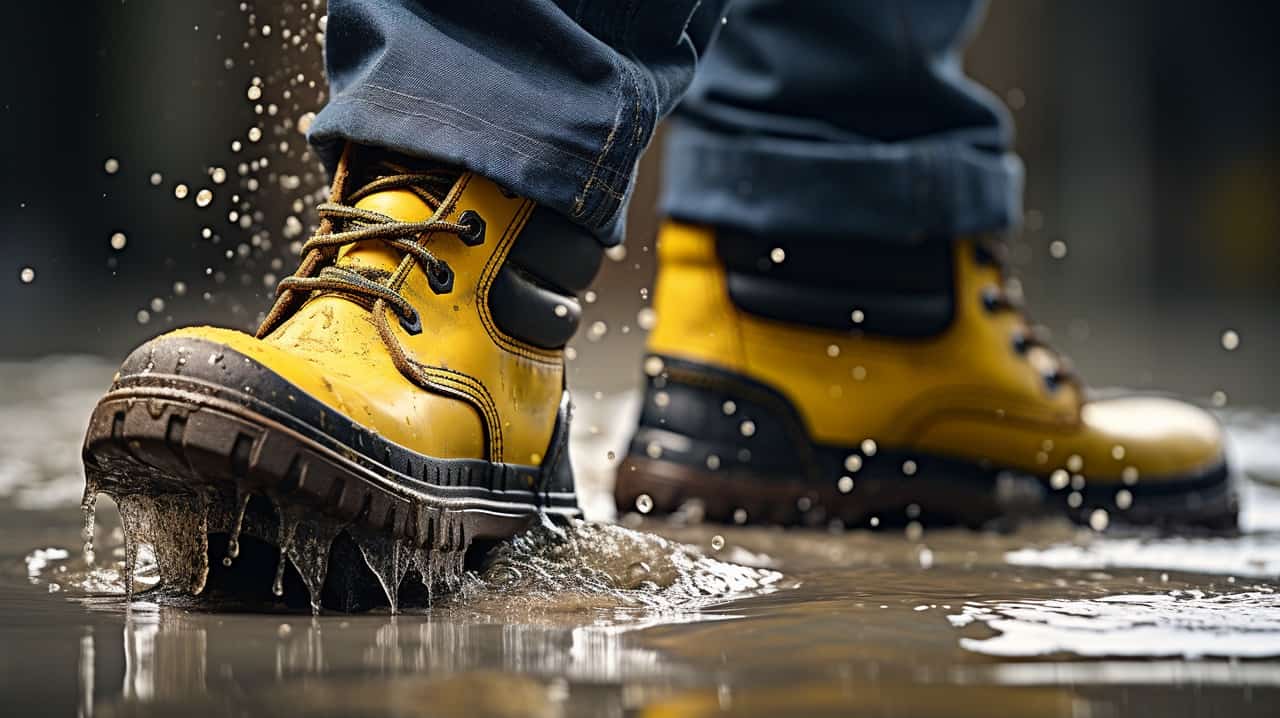Are you prepared to find the perfect set of work boots? Picture yourself at a building site, encircled by heavy-duty equipment and potential dangers. The ideal work boots can play a crucial role in securing your safety and comfort throughout your bustling workday.
In this guide, we’ll walk you through the process of selecting the right work boots tailored to your needs. This includes comprehending various boot types and evaluating essential safety aspects. By the end, you’ll be equipped with all the information necessary to make a well-informed choice.
Ready to take the first step? Let’s dive in!
‘Selecting the right work boots is not just about comfort, it’s about ensuring your safety in hazardous work environments.’
Key Takeaways
Consider the specific type of work boots needed for the job, such as everyday use, insulated for winter, steel-toed for added protection, or designed for women’s feet.
Ensure compliance with safety requirements set by OSHA and consider the level of protection required for the job.
Pay attention to the materials used in the construction of the work boots, such as leather, rubber, nylon, or plastic, and choose the most suitable option based on durability and protection needs.
Look for safety features like toe protection (steel capped or composite toe caps) and slip-resistant soles, and consider additional features like water resistance, comfort, and support.
Table of Contents
Navigating the World of Work Boots
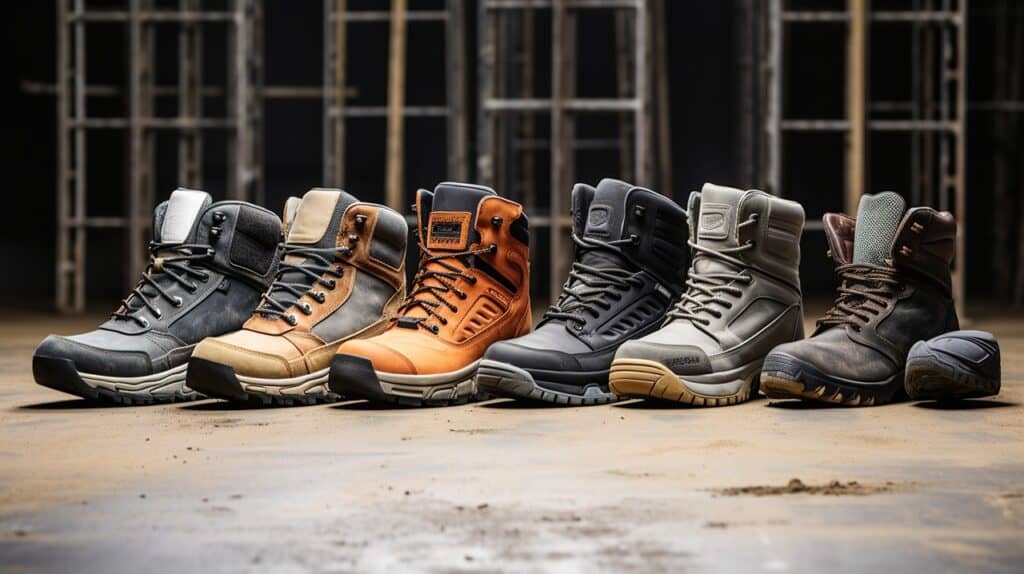
In your quest for the perfect work boots, you’ll encounter six distinct varieties. Each of these designs aims to deliver comfort, durability, and protection, tailoring to diverse needs and preferences.
Construction boots, a well-known category, demand meticulous scrutiny. Seek out manufacturers renowned for their commitment to quality and craftsmanship.
Before purchasing, keep in mind that safety toe boxes will take up a bit of space, so if you are inbetween sizes, size up. Remember that if it’s mildly uncomfortable during an initial try on, whether that be too much space or too little, this will only be exacerbated while wearing for a longer duration.
https://workboots.com/tradecraft/how-to-choose-work-boots
Another category to explore is leather work boots. These pairs combine style and utility, crafted from premium materials. For those who require anti-fatigue work boots, look for designs with extra cushioning and support that can alleviate foot strain and discomfort.
By unpacking the nuances of different work boots and weighing factors like brand credibility, material excellence, and comfort enhancements, you can zero in on the perfect pair to suit your unique requirements.
Grasping the Significance of Appropriate Workplace Footwear
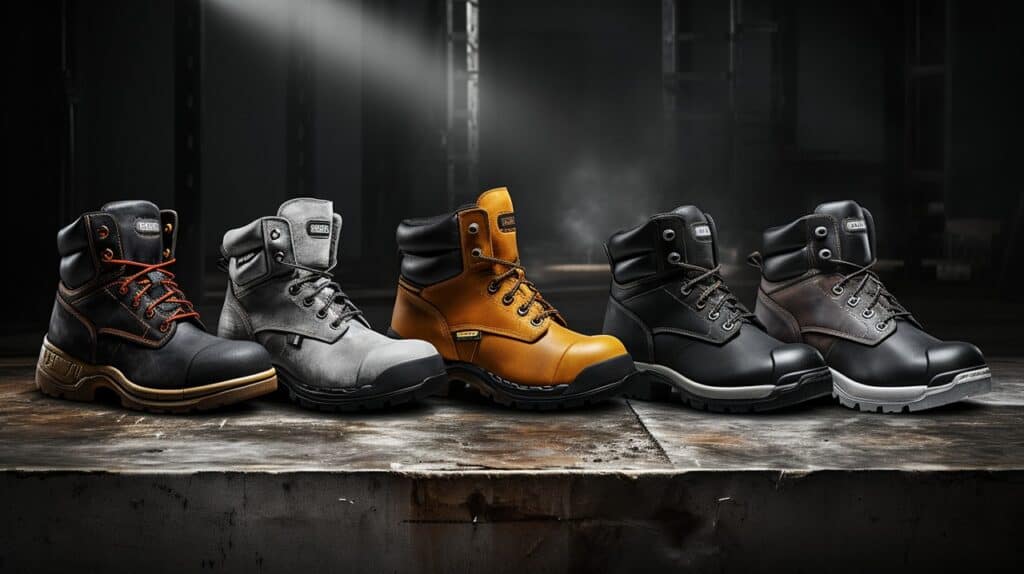
In order to fully appreciate the value of suitable workplace footwear, one needs to look at how it significantly diminishes injury risks and ensures adherence to safety standards. As you delve into the significance of workplace footwear, bear the following factors in mind:
- Embrace Comfort: High-quality work boots should deliver all-day comfort, enabling you to concentrate on your tasks without being plagued by discomfort or soreness.
- Understand the Degree of Protection Needed: Based on the nature of your work, you might require work boots that have specific safety characteristics, like reinforced toe guards or protection for the metatarsal bones, to safeguard against potential dangers.
- Adherence to Safety Standards: It’s absolutely vital to opt for work boots that align with industry safety norms to guarantee your safety and comply with regulations.
When it comes to choosing the most comfortable work boots or evaluating the significance of workplace footwear, think about the distinct requirements of your role and seek a reputable and dependable brand that provides top-notch and trustworthy work boots.
In the words of a wise person, ‘Your safety should always be your priority. Choosing the right work footwear is a step towards that direction.’
Evaluating Work Boot Uppers
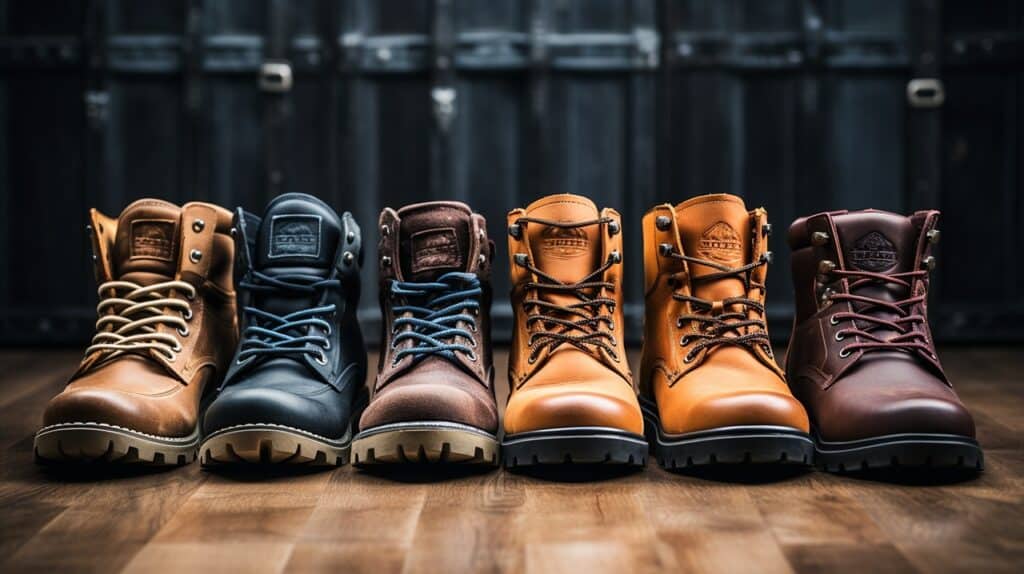
When you’re in the market for work boots, it’s vital to focus on the upper part of the boot. This section plays a crucial role in providing the durability and protection you need on the job.
If you’re on a budget, consider affordable work boots for men, made with synthetic materials such as nylon or polyurethane (PU) leather. These materials offer an economical yet effective solution.
‘Comfort shouldn’t mean compromising on quality. Full-grain leather work boots, especially in classic black, offer both comfort and protection. This material not only provides flexibility but also shields your feet from potential hazards.’
For those seeking lightweight work boots for men, options made of nylon or mesh are worth considering. These materials keep the boots light without sacrificing durability.
In the realm of construction work boots, the best ones feature uppers constructed from robust materials such as full-grain leather or rubber. These materials are known for their longevity and the protection they offer.
And when it comes to heavy-duty work boots, look for uppers crafted from sturdy leather or rubber. Additional features such as reinforced stitching or extra layers boost durability, making them ideal for the toughest jobs.
Always remember: a well-chosen work boot enhances your performance, safety, and comfort on the job.
Selecting the Ideal Outsole for Your Work Boots
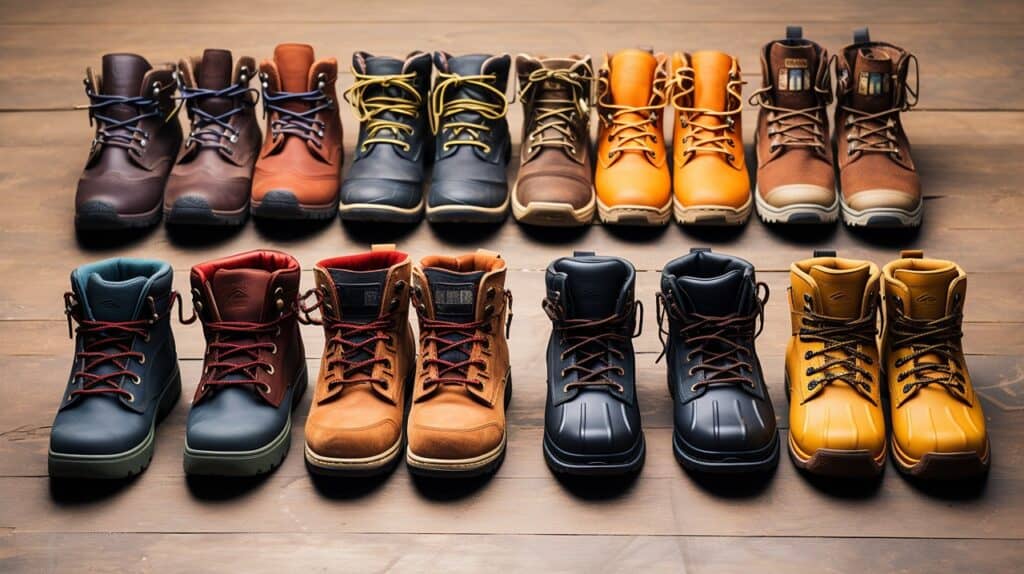
The performance and safety of your work boots largely hinge on the type of outsole they have. Here are a few crucial aspects to remember when you’re on the hunt for the perfect outsole:
- Resistance to Slippage: Outsoles crafted from rubber or thermoplastic polyurethane (TPU) are known for their superior grip, making them an excellent choice for those employed in construction or other jobs where the risk of slipping is high.
- Protection from Electrical Hazards: If you’re an electrician or your job involves handling electrical equipment, go for boots with outsoles engineered to shield you from electrical dangers.
- Waterproof qualities: Those who work in wet or rainy conditions should opt for outsoles that are either water-resistant or waterproof to keep your feet dry.
By keeping these factors in mind, you can select the most suitable work boots, whether you’re in construction, an electrician, or in any other profession that demands sturdy boots with the right outsoles.
Understanding Water-Resistance and Comfort in Work Boots
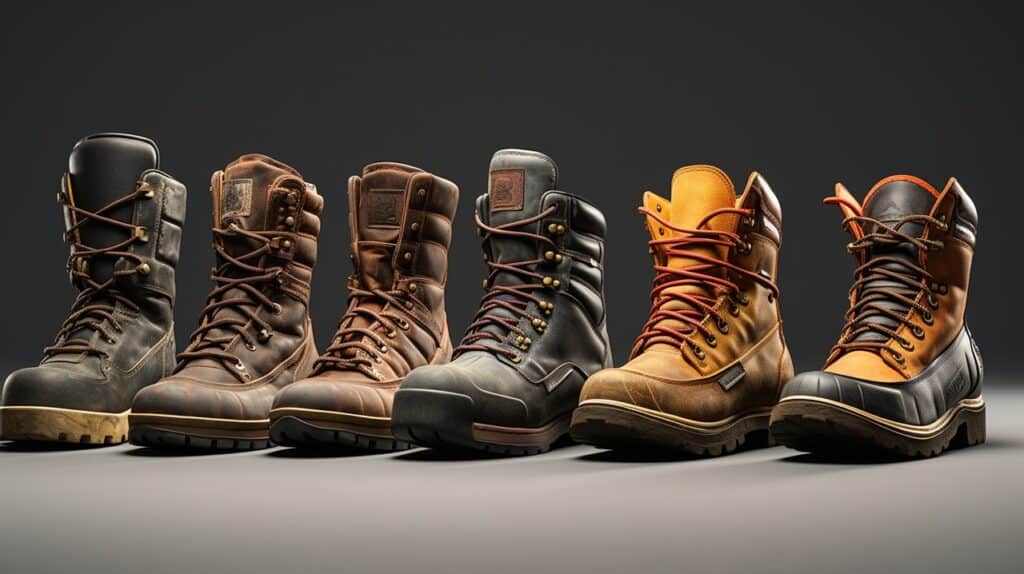
When it comes to finding the perfect work boots, two factors to consider are water resistance and comfort. You’ll want to ensure that your feet stay dry and are well-protected throughout your workday. To assist your decision-making process, we’ve prepared a comparison chart of various work boots, highlighting their water-resistance and comfort features:
| Type of Work Boots | Water-Resistance Characteristics | Comfort Features |
|---|---|---|
| Construction-focused Boots | Waterproof and breathable materials employed | Extra padding for enhanced comfort |
| Top-rated Work Boots | Designed for water-resistant performance in wet conditions | Ventilated design for dry and comfortable feet |
| Innovative Work Boots | Uses water-repellent materials and fast-wicking lining | Durable, abrasion-resistant mesh design |
| Leading Work Boot Brands | Incorporates water-resistant MAG-Dry technology membrane | Designed to flex and accommodate foot swelling |
| Comfort-centric Work Boots | Water-resistance suitable for dusty conditions | Features supportive shanks for arch support |
By carefully considering these elements, you’re sure to find work boots that not only offer superior water resistance but also promise unparalleled comfort throughout your workday.
Evaluating Protective Elements and Craftsmanship Materials for Work Boots
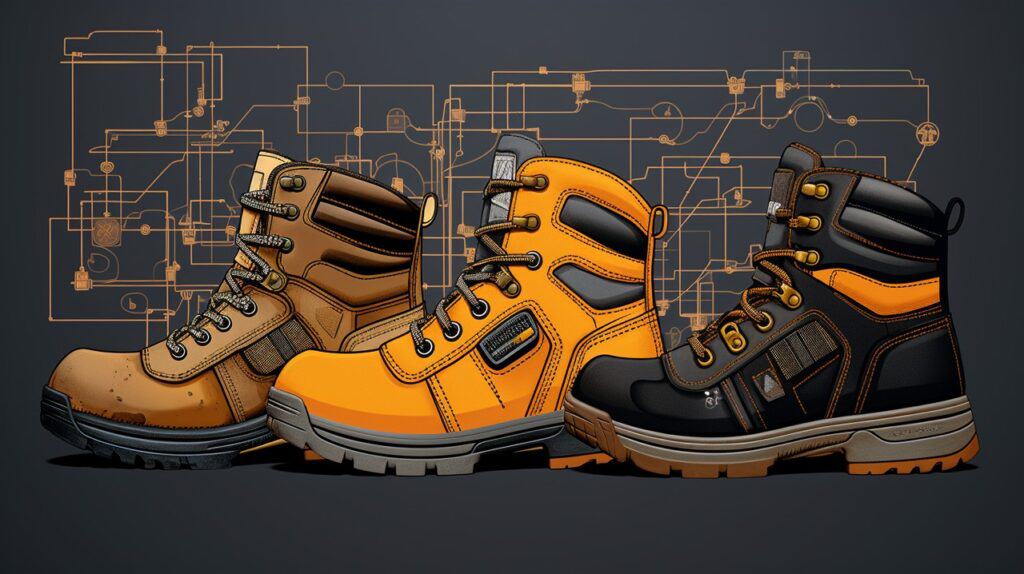
Delve deeper into the world of work boots by meticulously examining the protective elements and craftsmanship materials that align with your specific work conditions. The importance of safety features, designed to shield your feet from potential dangers, can’t be overstated.
Seek boots that offer toe protection – think steel-capped or composite toe caps. Steel-capped toes effectively guard against heavy or sharp objects, although they mightn’t maintain a comfortable temperature. Conversely, composite toe caps deliver the same level of safeguard without causing temperature-related discomfort.
Moreover, consider other protective elements such as lightweight composite toe-caps and anti-penetration plates. The materials used in boot construction also have a significant impact on your choice. For example, leather provides durability, flexibility, and protection, making it a solid choice for many work environments. Rubber, on the other hand, is an excellent option for jobs involving a risk of electric shock.
Remember these considerations when selecting work boots to guarantee both the safety and comfort required for your unique work conditions.
‘Choosing the right work boot isn’t just about style or price. It’s about finding the right balance between safety, comfort, and suitability to your work environment.’
Frequently Asked Questions
What Is the Average Lifespan of a Pair of Work Boots?
The average lifespan of work boots varies depending on factors such as usage, material, and maintenance. However, on average, work boots can last anywhere from six months to two years with proper care.
Can Work Boots Be Resoled if the Sole Wears Out?
Yes, work boots can be resoled if the sole wears out. Resoling extends the life of your boots and saves you money. Look for boots with welt construction, as they are easier to resole.
Are There Any Specific Guidelines for Cleaning and Maintaining Work Boots?
To clean and maintain work boots, follow these guidelines: 1) Remove dirt and debris with a brush or damp cloth. 2) Use a specialized cleaner if needed. 3) Apply a waterproofing agent. 4) Store boots in a cool, dry place.
How Often Should Work Boots Be Replaced?
To keep your feet safe and comfortable, replace work boots regularly. Look for signs of wear and tear, such as worn-out soles or damaged toe protection. Don’t wait until they’re falling apart.
Are There Any Specific Brands or Models of Work Boots That Are Recommended for Certain Professions or Industries?
There are specific brands and models of work boots recommended for certain professions or industries. Magnum boots, known for durability, protection, and comfort, offer various features to meet specific job requirements.
